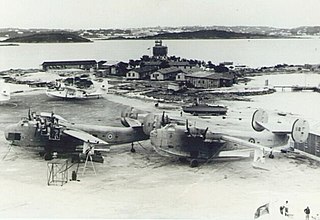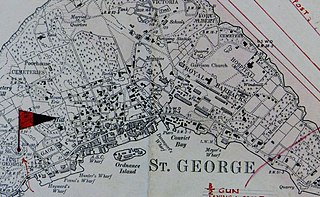 W
WCharles William Beebe was an American naturalist, ornithologist, marine biologist, entomologist, explorer, and author. He is remembered for the numerous expeditions he conducted for the New York Zoological Society, his deep dives in the Bathysphere, and his prolific scientific writing for academic and popular audiences.
 W
WThe Bermuda Conference was an international conference between the United Kingdom and the United States held from April 19 to 30, 1943, at Hamilton, Bermuda. The topic of discussion was the question of Jewish refugees who had been liberated by Allied forces and those who still remained in Nazi-occupied Europe. The only agreement reached was that the war must be won against the Nazis. US immigration quotas were not raised, and the British prohibition on Jewish refugees seeking refuge in Mandatory Palestine was not lifted.
 W
WThe Bermuda Garrison was the military establishment maintained on the British Overseas Territory and Imperial fortress of Bermuda by the regular British Army and its local militia and voluntary reserves from 1701 to 1957. The garrison evolved from an independent company, to a company of Royal Garrison Battalion during the American War of Independence, and a steadily growing and diversifying force of artillery and infantry with various supporting corps from the French Revolution onwards. During the American War of Independence, the garrison in Bermuda fell under the military Commander-in-Chief of North America. Subsequently, it was part of the Nova Scotia Command until 1868, and was an independent Bermuda Command from then 'til its closure in 1957.
 W
WThe Bermuda Railway was a 21.7-mile (34.9 km) common carrier line that operated in Bermuda for a brief period. In its 17 years of existence, the railway provided frequent passenger and freight service over its length spanning most of the archipelago from St. George's in the east to Somerset, Sandys Parish, in the west.
 W
WDavid George Brownlow Cecil, 6th Marquess of Exeter KCMG OLY, styled Lord Burghley before 1956 and also known as David Burghley, was an English athlete, sports official, peer, and Conservative Party politician. He won the gold medal in the 400 m hurdles at the 1928 Summer Olympics.
 W
WAdmiral Sir Irvine Gordon Glennie KCB was a Royal Navy officer who went on to be Commander-in-Chief, America and West Indies Station.
 W
WAdmiral Sir Charles Edward Kennedy-Purvis was a Royal Navy officer who went on to be Deputy First Sea Lord.
 W
WThe MarketPlace Limited is a grocery store chain in Bermuda.
 W
WThe Royal Air Force (RAF) operated from two locations in Bermuda during the Second World War. Bermuda's location had made it an important naval station since US independence, and, with the advent of the aeroplane, had made it as important to trans-Atlantic aviation in the decades before the Jet Age. The limited, hilly land mass had prevented the construction of an airfield, but, with most large airliners in the 1930s being flying boats, this was not initially a limitation.
 W
WSt. George's Garrison was the first permanent military camp of the Bermuda Garrison established in the British colony and Imperial fortress of Bermuda, with construction of Old Military Road and the original Royal Barracks commencing during the war between Britain and France that followed the French Revolution. It would remain in use until 1957, when it was transferred to the civil (colonial) government with most of the other Admiralty and War Office properties in Bermuda.